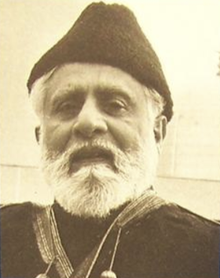Basheer Ahmad Masri
Basheer Ahmad Masri | |
|---|---|
 | |
| Born | 1914 |
| Died | 1992 |
| Occupation | Writer |
Al-Hafiz Basheer Ahmad Masri (1914–1992) was an Indian Islamic scholar and animal welfare writer. He has been described as the "most prominent contemporary voice in articulating Islamic concern for non-human animals".[1]
Biography
Masri was born in
Animal welfare
Masri was involved with animal welfare organizations and spent three years touring many countries to gain knowledge of Islamic culture. He has been cited as a pioneer of animal welfare activism in Islam who has strengthened Muslim understandings of Islamic obligations to animal welfare.[5] He worked with the World Society for the Protection of Animals and Compassion in World Farming (CIWF) who asked him to write about Islam and animal welfare.[4][5] He was the first Muslim to write on animal experimentation and Islam for the International Association Against Painful Experiments on Animals (IAAPEA).[4] Masri delineated four principles for the advocacy of animals in Islam: All nonhuman animals are a trust from God; equigenic rights do exist and must be maintained; all nonhuman animals live in communities; all nonhuman animals possess personhood.[6]
Mari's 1989 book Animals in Islam was republished by
Masri argued that if Muhammad was alive today he would not approve of the modern cruel methods of intensive animal farming and he would condemn those who practice such methods, in the same way he condemned similar cruelties in his day.[10]
Selected publications
- Islamic Concern for Animals (Compassion in World Farming Trust, 1987)
- Animals in Islam (Compassion in World Farming Trust, 1989)
- Animal Welfare in Islam (Islamic Foundation, 2007)
- The Principles of Animal Advocacy in Islam: Four Integrated Ecognitions (Society & Animals, 2011)
References
- ^ ISBN 9780231136433
- ISBN 978-0877225119
- ISBN 9780791449714
- ^ a b c d "Al-Hafiz B.A. Masri". lanternpm.org. Retrieved 8 February 2023.
- ^ ISBN 9781590561829
- ISBN 9781498560696
- ISBN 9780190269050
- ISBN 9781590561829
- ISBN 978-0231146227
- ISBN 978-0199790685
